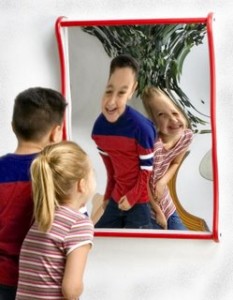Inspired by Matt Madden’s exercises in style and tickled by my latest attempt(s) to explain who I am, how I got here, and what it is I do exactly. It’s not distortion so much as perspective… although I suppose one’s perspective determines the magnitude of distortion…
Oy. Academia.
From networking email #4982:
I came to this work via my experiences as an early childhood educator, cross-cultural researcher, improvisational comedian, storyteller, and deep thinker about how to make the world a better place. I’ve concluded that it’s most moral and most efficient to nurture individuals from the beginning of their lives, support their development of wonderfully versatile and inexpressibly important social and emotional skills, and use play as the mode for doing so.
According to the Collaborative for Academic, Social, and Emotional Learning, social and emotional core competencies include self-awareness, self-regulation, social awareness, relationship skills, and responsible decision-making. Self-regulation, which might be called emotional regulation or even executive functioning, is the core competency that is taught LEAST of all these too-little-taught social and emotional skills. This indicates a gap, clearly, and might indicate an incredibly distressing gap, even an emergency, if one considers self-regulation to be THE most important skill of them all… My research and applied work seeks to redress that.
To learn more about me, I invite you to peruse laurelfelt.org. In prose, here is a short(ish) bio:
“Laurel Felt, a fourth-year doctoral candidate at USC’s Annenberg School for Communication & Journalism, is guided by her desire to support children’s healthy development. Accordingly, Laurel has designed numerous research protocols, pedagogical interventions, and professional development experiences to nurture youths’ social and emotional competence, critical thinking, and meaningful communication.
Laurel conceptualizes play as the primary vehicle for this human-centered, learning-oriented work. She is a research assistant with the USC Annenberg Innovation Lab’s PLAY! (Participatory Learning And You!) Project, co-chair of interdisciplinary working group USC Impact Games, and a consultant with play-oriented non-profits Laughter for a Change and GameDesk. In Fall 2012, she will join the USC Joint Education Project, one of the nation’s oldest service-learning organizations, as a curriculum developer and technology consultant.
Laurel’s dissertation will examine Dojo, an impact game created by GameDesk that uses biofeedback to train users (intended for urban adolescent males) in emotional regulation. The project will use a mixed method, experimental + participatory research design to explore intended effects and unexpected outcomes from respectively playing Dojo, engaging with Laurel’s complementary Dojo curriculum, doing both, or doing neither (control group).
Laurel received her B.S. in Education & Social Policy from Northwestern University and M.A. in Child Development from Tufts University. Some organizations that Laurel has worked with include: Nickelodeon; PBSKids Ready to Learn; Hollywood, Health & Society; the BBC World Service Trust; Sénégal’s Réseau African d’Education pour la Santé; India’s Expanding Minds Program; and the U.S. Department of Education. Her research also looks at community development, assessment validity, childhood obesity, and bullying.”


